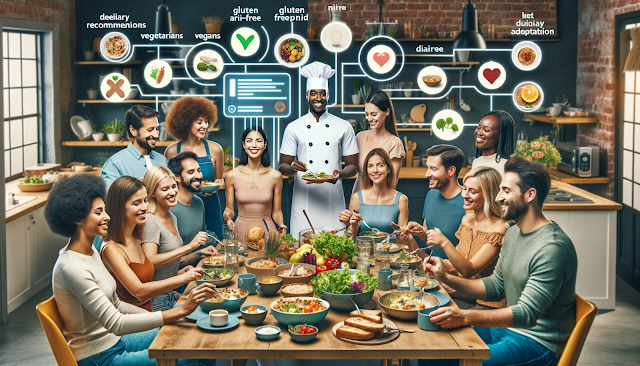AI and Culinary Adaptation
 |
| Food Diversity courtesy OAII |
In today's diverse culinary landscape, accommodating dietary restrictions has become increasingly important for chefs and home cooks alike. Whether due to health reasons, personal beliefs, or lifestyle choices, many individuals have specific dietary requirements that need to be considered when preparing meals. Fortunately, advancements in AI technology are making it easier than ever to navigate these dietary restrictions and create delicious, satisfying dishes that cater to everyone's needs.
Understanding Dietary Restrictions
- Health Concerns: Many people have dietary restrictions related to health concerns such as food allergies, intolerances, or medical conditions like diabetes or celiac disease. These individuals must avoid certain ingredients or food groups to prevent adverse reactions and maintain their health and well-being
- Ethical and Religious Beliefs: Others may choose to follow specific dietary practices based on ethical or religious beliefs, such as vegetarianism, veganism, or kosher and halal dietary laws. These dietary restrictions often involve avoiding certain animal products or adhering to specific food preparation methods.
- Lifestyle Choices: Additionally, some individuals may adopt dietary restrictions as part of their lifestyle choices, such as following a paleo, ketogenic, or low-carb diet for weight management or performance optimization. These dietary approaches may involve limiting certain types of foods while emphasizing others to achieve specific health or fitness goals.
The Role of AI in Culinary Adaptation
AI technology is playing a crucial role in helping chefs and home cooks adapt to various dietary restrictions and preferences. By leveraging machine learning algorithms and data analytics, AI-driven platforms can analyze recipe databases, ingredient lists, and nutritional information to suggest suitable substitutions, alternatives, and modifications for specific dietary needs.
 |
| AI in culinary adaptation Image generated by DALL-E |
These platforms offer invaluable assistance in identifying ingredients that may trigger allergic reactions or intolerances, allowing individuals with dietary restrictions to confidently navigate their culinary choices. For example, someone with a gluten intolerance can rely on AI-powered apps to identify gluten-free recipes and recommend alternative ingredients that mimic the taste and texture of gluten-containing foods.
Moreover, AI-driven recipe recommendation systems empower users to explore new culinary horizons while adhering to their dietary preferences. Whether it's discovering plant-based alternatives, low-carb options, or allergen-free substitutes, these platforms provide personalized recommendations tailored to individual tastes and dietary restrictions.
By embracing AI technology, chefs and home cooks can overcome the challenges associated with accommodating diverse dietary needs without compromising on flavor, creativity, or nutritional value. From creating allergen-free menus to offering customizable meal options, AI-driven solutions enable culinary professionals to cater to a broader range of preferences and ensure that everyone can enjoy a delicious dining experience.
In essence, AI plays a pivotal role in promoting inclusivity and diversity in the culinary world by providing innovative solutions for adapting recipes, creating personalized dining experiences, and fostering a sense of community around food. As technology continues to evolve, AI-driven culinary adaptation will undoubtedly become increasingly sophisticated, empowering individuals with dietary restrictions to explore, experiment, and enjoy a wide variety of delicious and satisfying dishes.
Empowering Culinary Creativity
Furthermore, AI-powered recipe recommendation systems can inspire culinary creativity by offering personalized recipe suggestions tailored to individual tastes, preferences, and dietary restrictions. Whether you're looking for gluten-free, dairy-free, or vegetarian options, AI technology can help you discover new and exciting dishes that cater to your specific dietary requirements without sacrificing flavor or satisfaction.
Meet Emily, a passionate home cook who loves experimenting in the kitchen. Recently, Emily's friend invited her over for dinner, but there was a twist – the meal had to be completely gluten-free due to her friend's dietary restrictions. Excited by the challenge, Emily turned to her AI-powered recipe recommendation app for inspiration.
As she scrolled through the app, Emily was impressed by the wide selection of gluten-free recipes available. From hearty mains to decadent desserts, there seemed to be no shortage of options to choose from. However, Emily was determined to find something unique and unexpected to impress her friend.
After inputting her friend's dietary preferences and browsing through various categories, Emily stumbled upon a recipe for gluten-free stuffed bell peppers with quinoa and black beans. Intrigued by the combination of flavors and textures, she decided to give it a try.
Following the step-by-step instructions provided by the app, Emily prepared the dish with ease, using AI-generated tips and tricks to enhance the flavor and presentation. As the stuffed peppers baked in the oven, Emily couldn't help but feel a sense of pride and excitement at the prospect of sharing her culinary creation with her friend.
When the moment finally arrived, Emily's friend was blown away by the delicious aroma wafting from the kitchen. As they sat down to enjoy the meal together, Emily's friend couldn't stop raving about the flavors and textures of the dish. Thanks to AI technology, Emily had successfully navigated her friend's dietary restrictions and created a memorable dining experience for both of them.
Inspired by her culinary success, Emily continued to explore new recipes and ingredients with the help of her AI-powered recipe recommendation app. With each dish she prepared, Emily discovered new ways to express her creativity and expand her culinary repertoire, all while accommodating her friend's dietary needs.
In the end, Emily realized that AI technology wasn't just a tool for finding recipes – it was a source of inspiration and empowerment that allowed her to unleash her full culinary potential and share her love of food with those around her.
Embracing Inclusivity and Diversity
In today's interconnected world, inclusivity and diversity are essential values that extend to the culinary realm. By embracing AI-driven solutions for culinary adaptation, chefs and home cooks can create inclusive dining experiences that accommodate diverse dietary preferences and restrictions. Whether you're hosting a dinner party, running a restaurant, or cooking for your family, AI technology can help you ensure that everyone can enjoy a delicious meal that meets their individual needs and preferences.

Comments